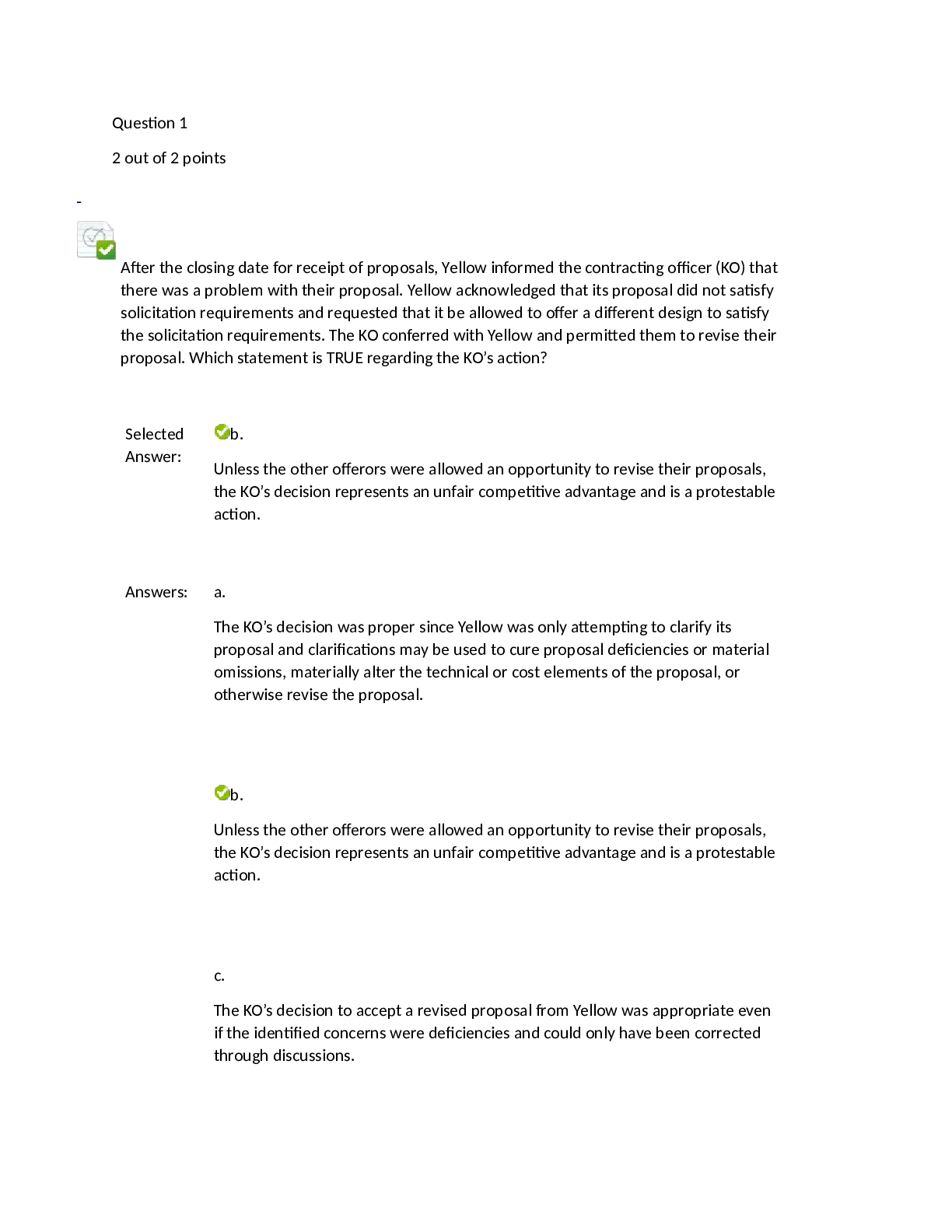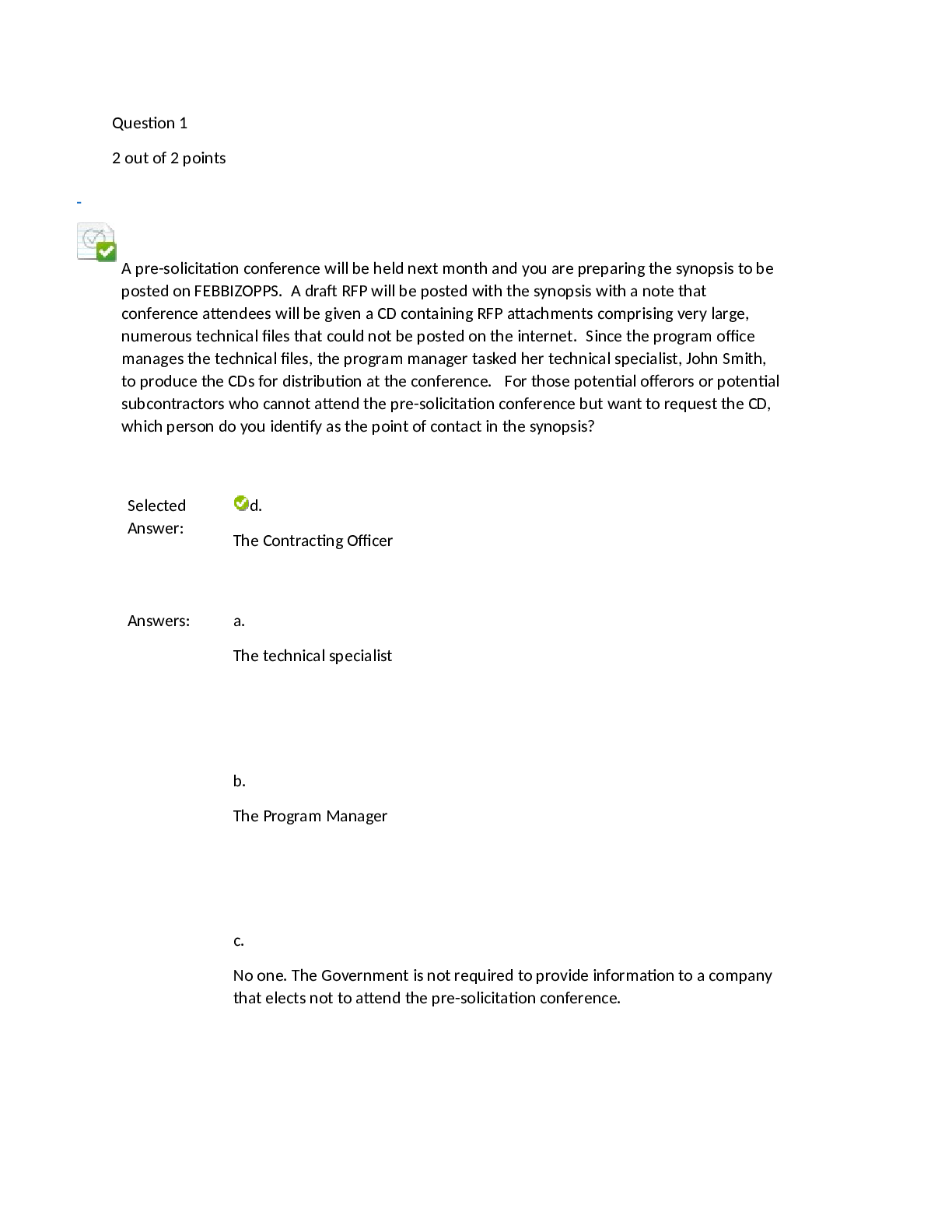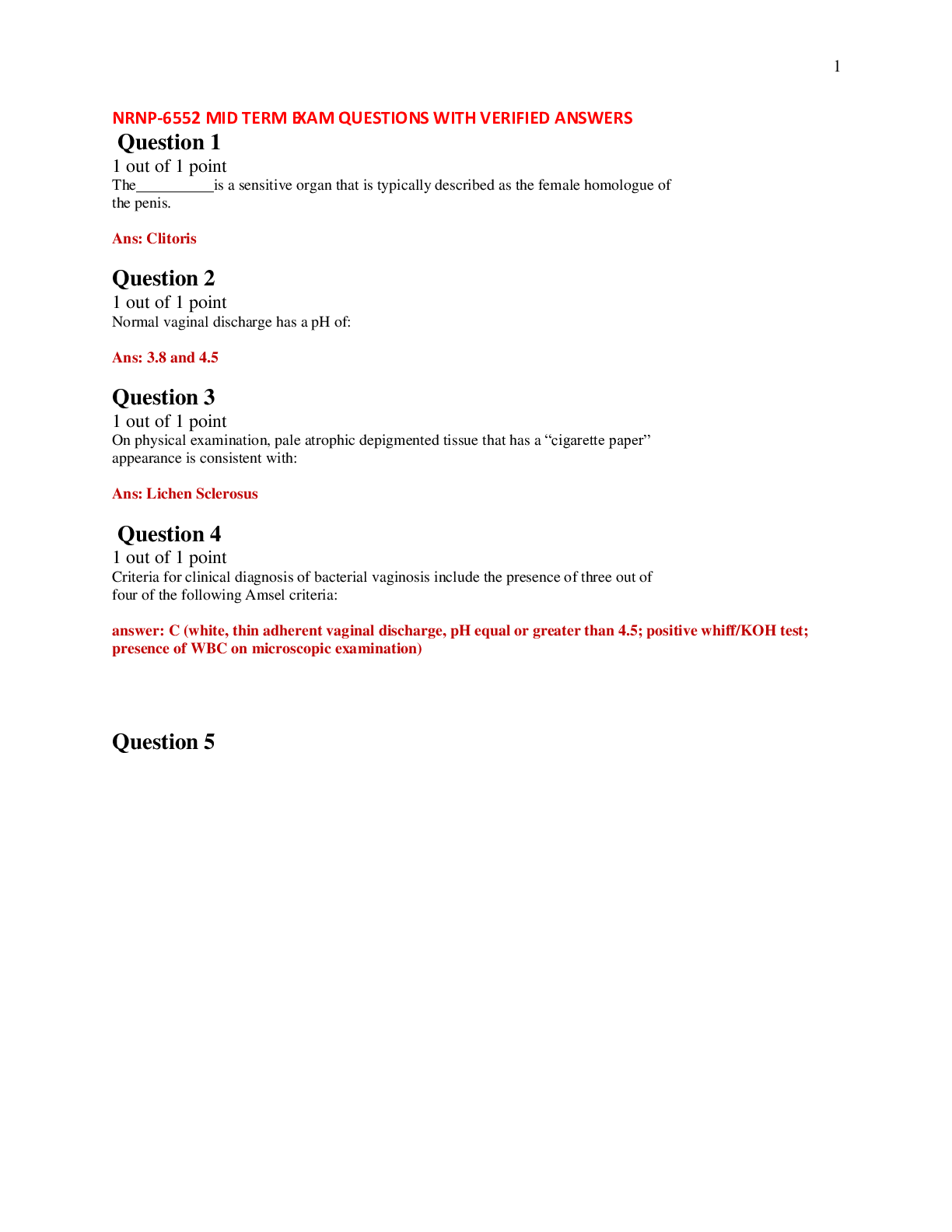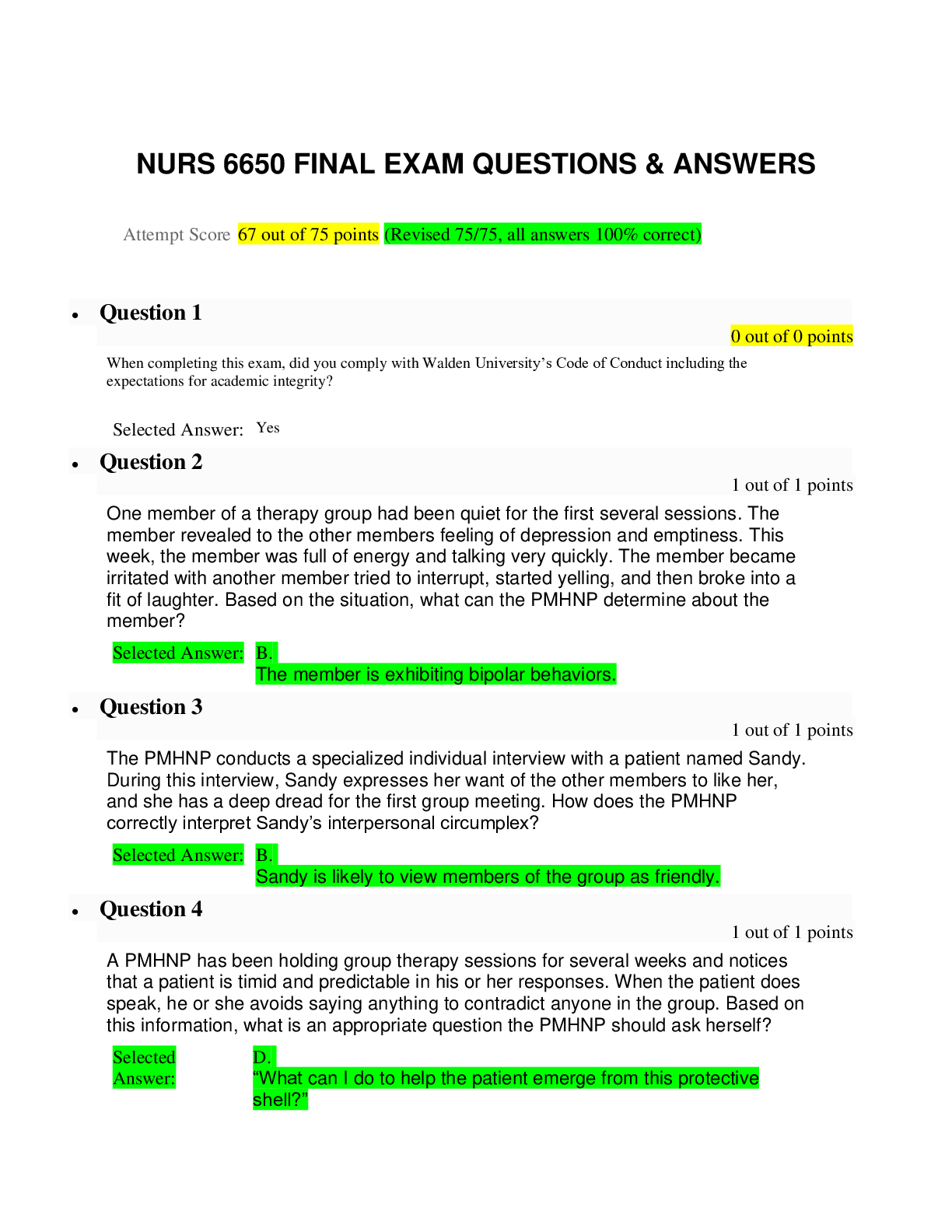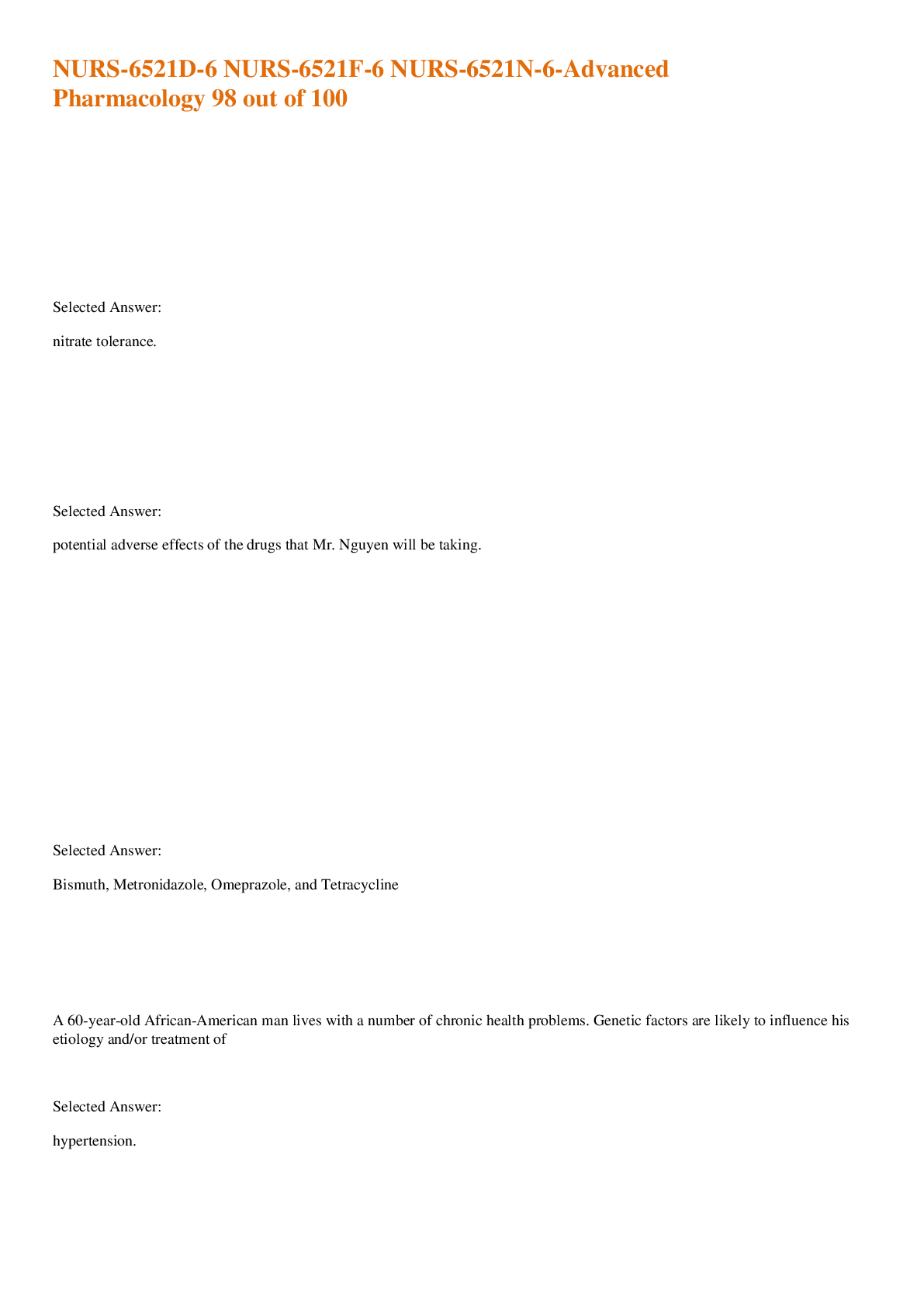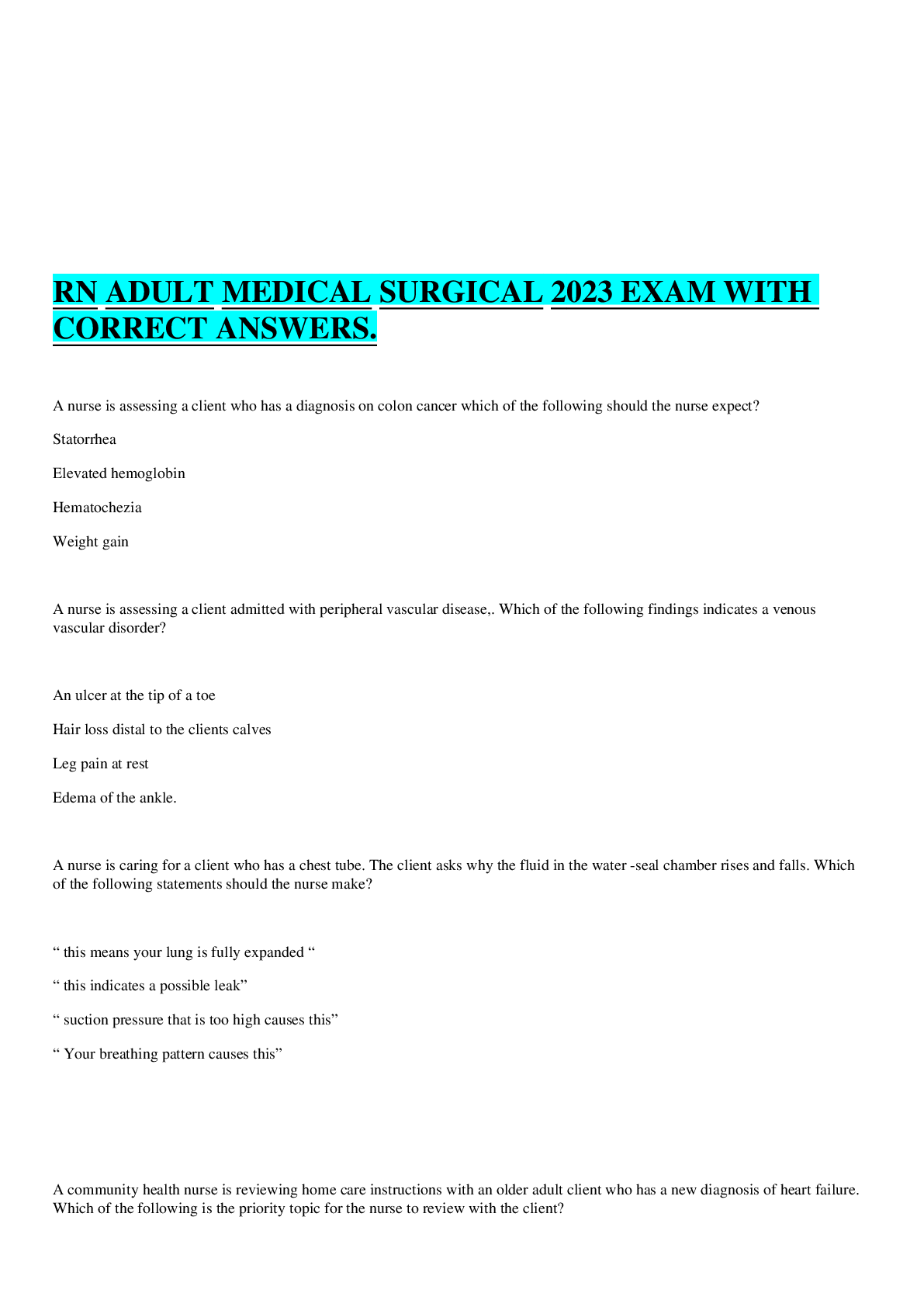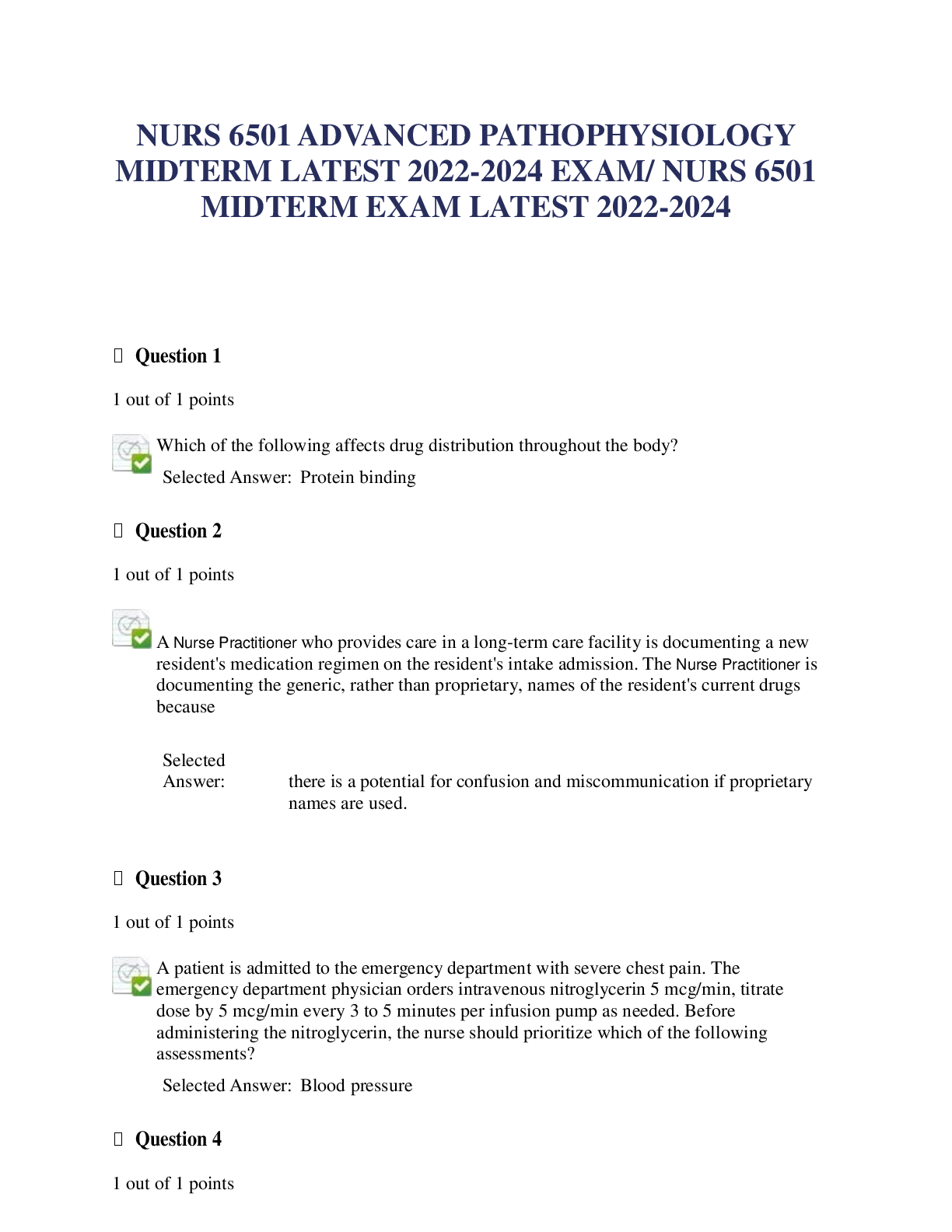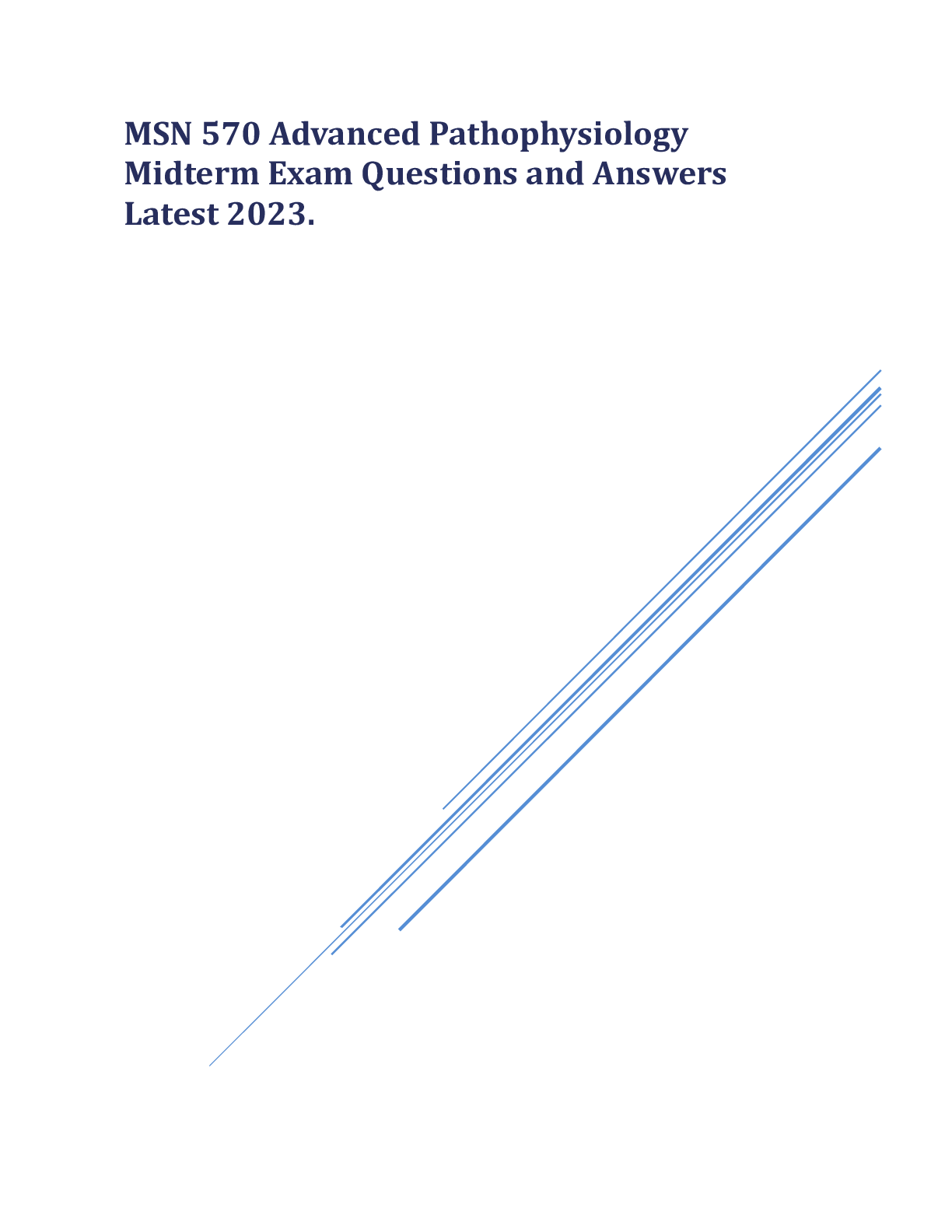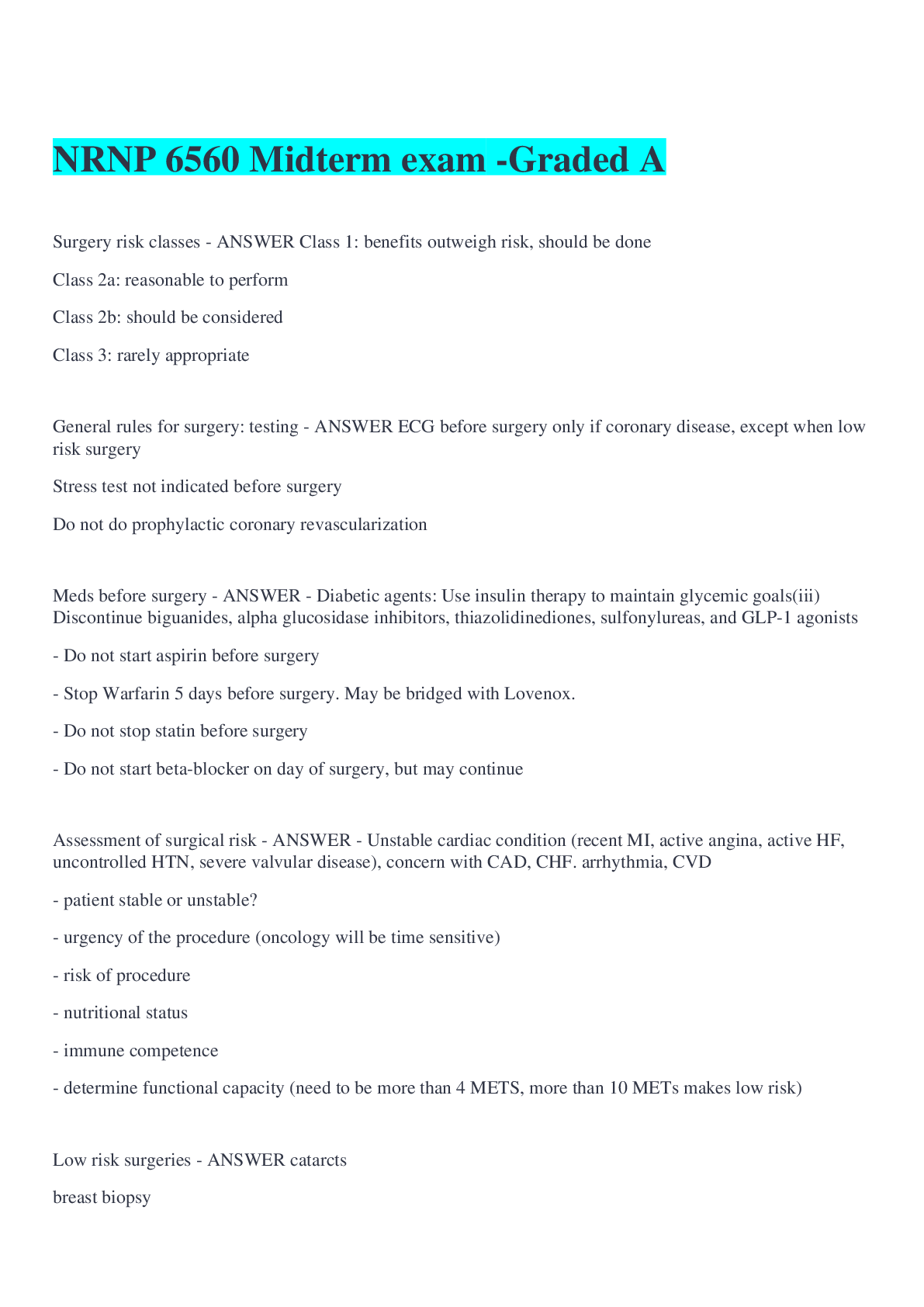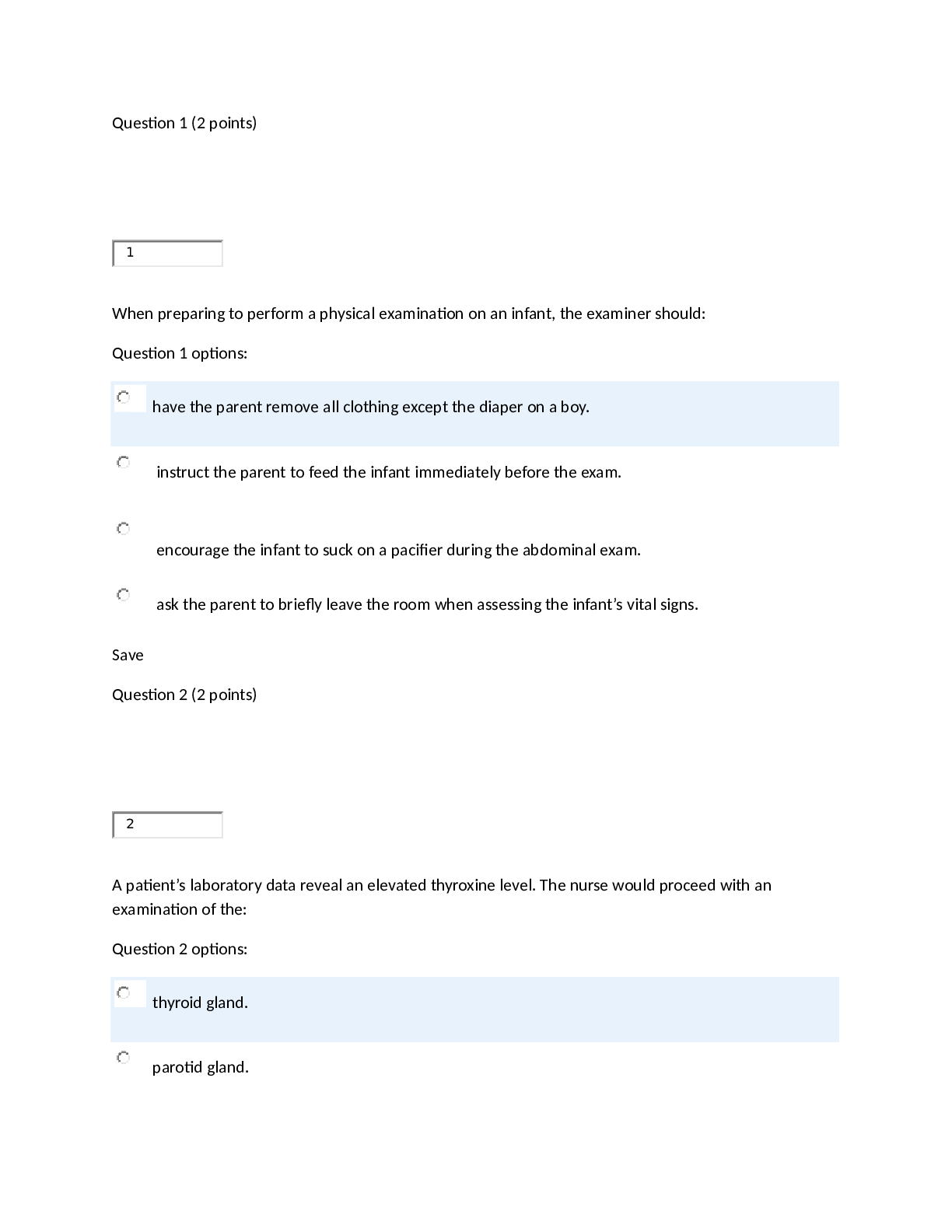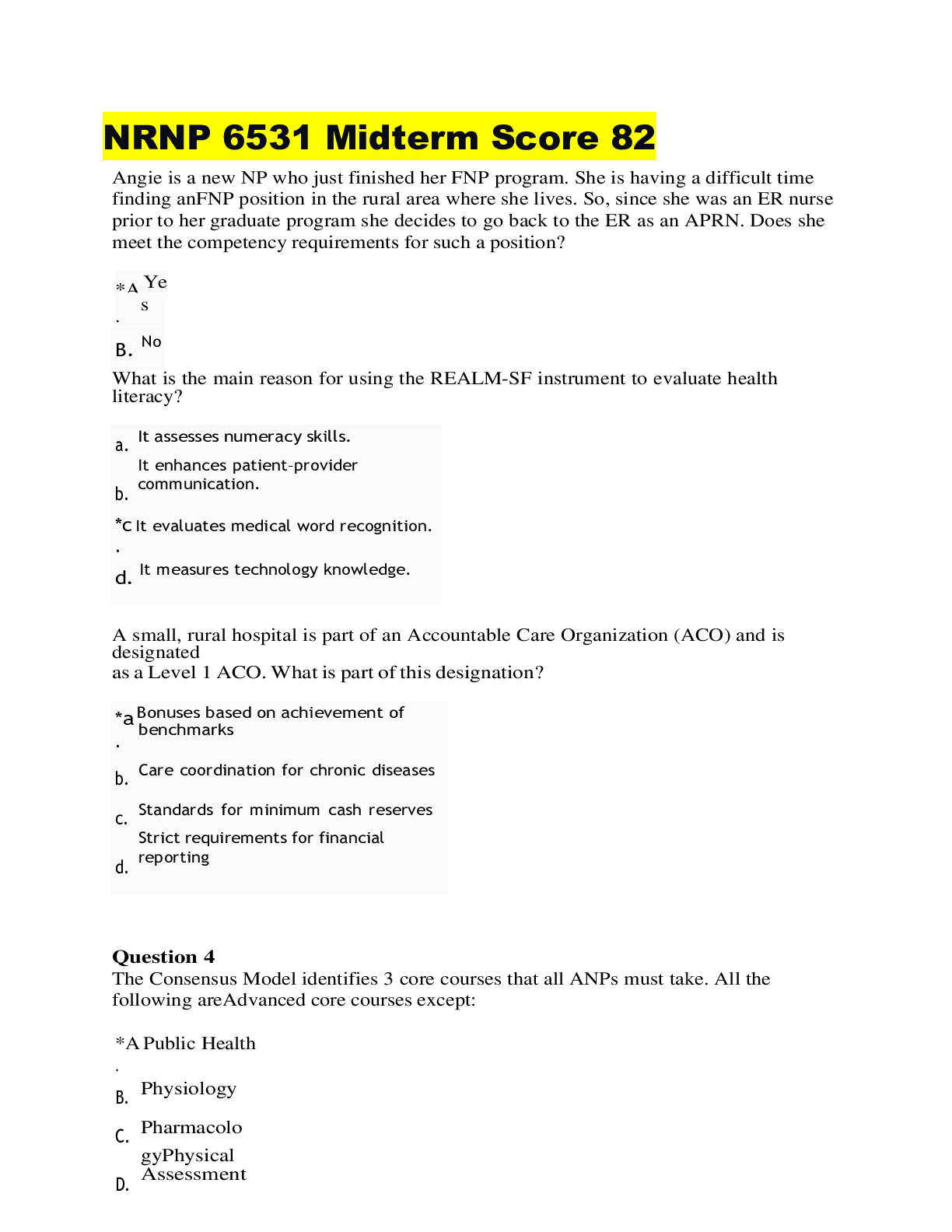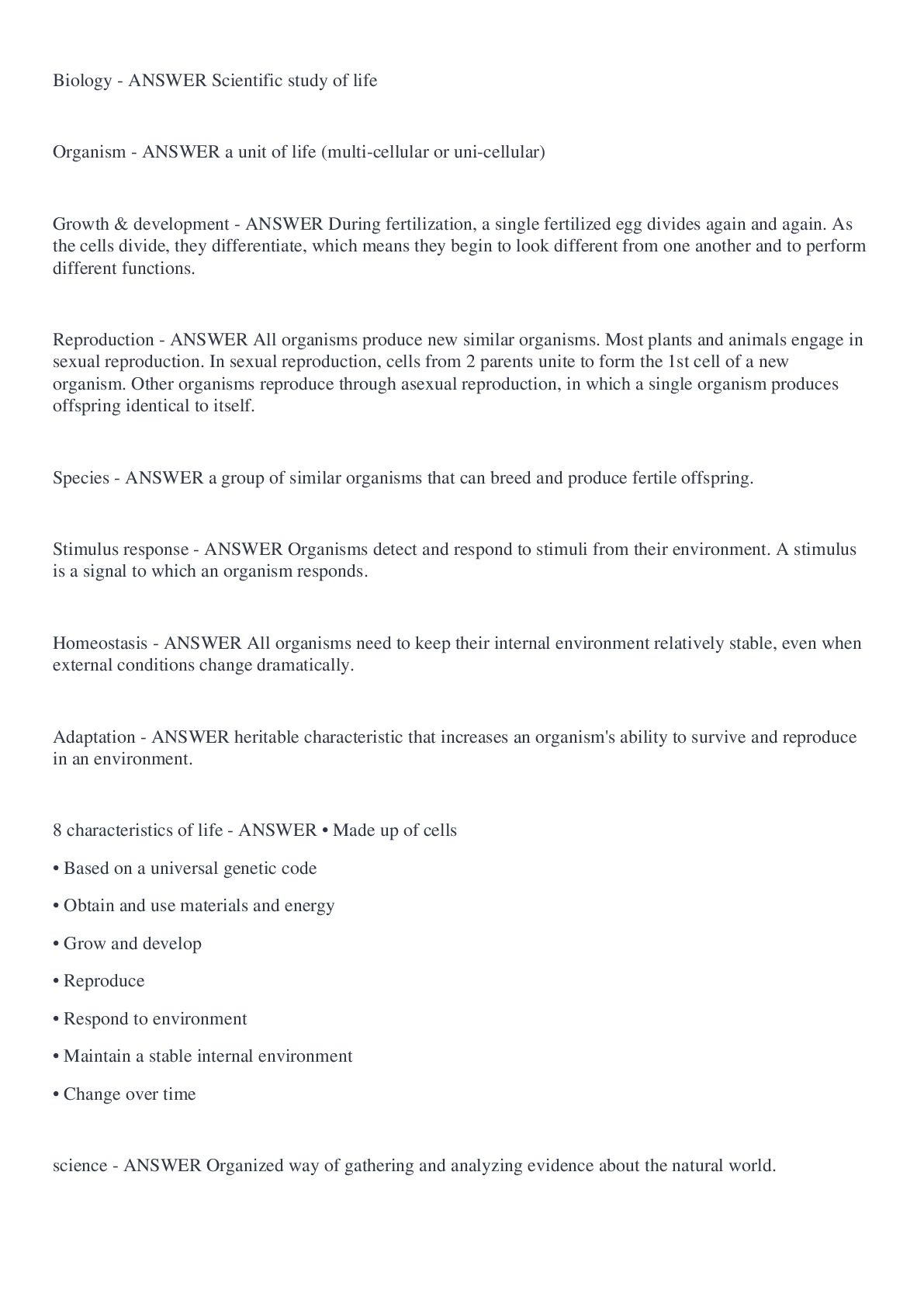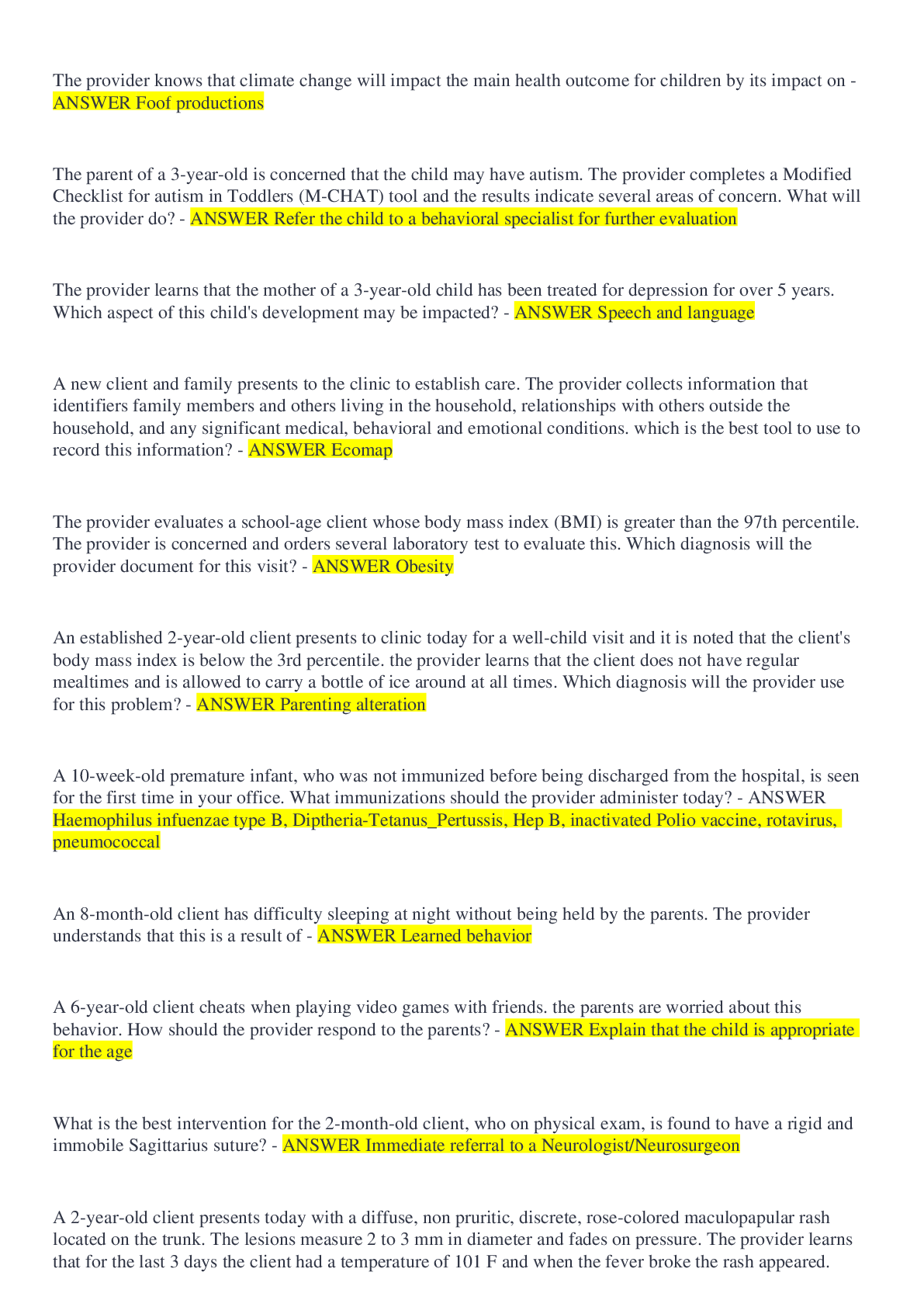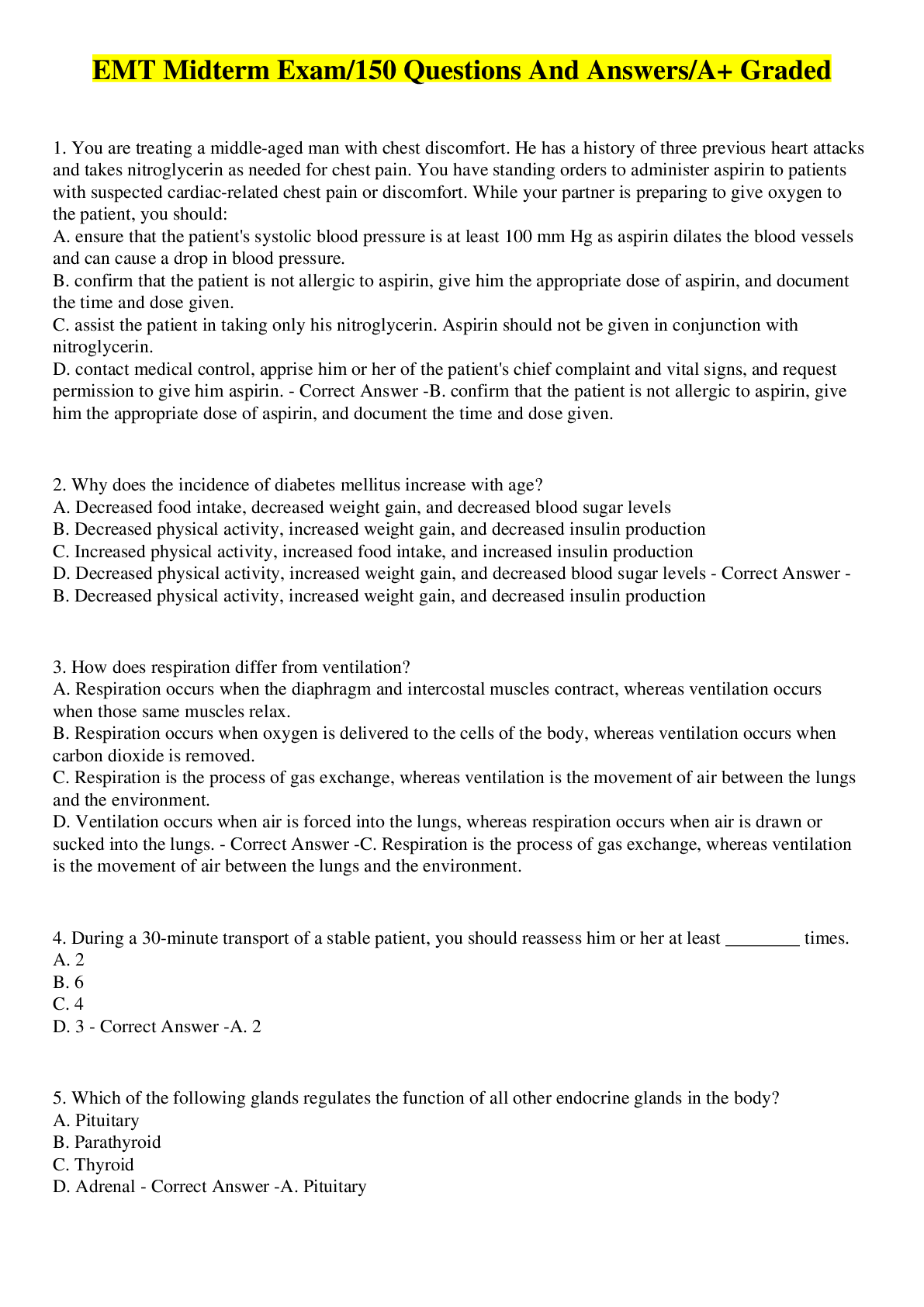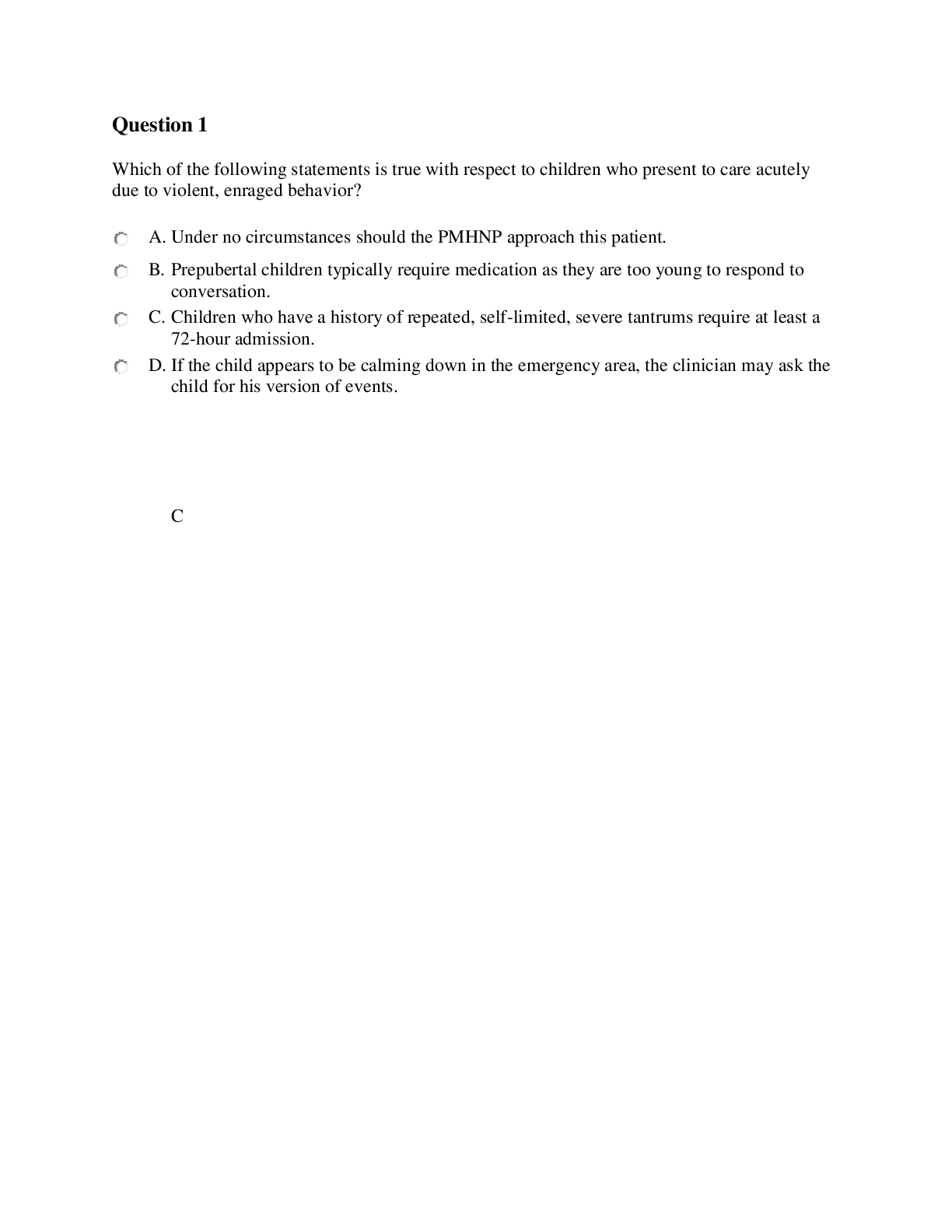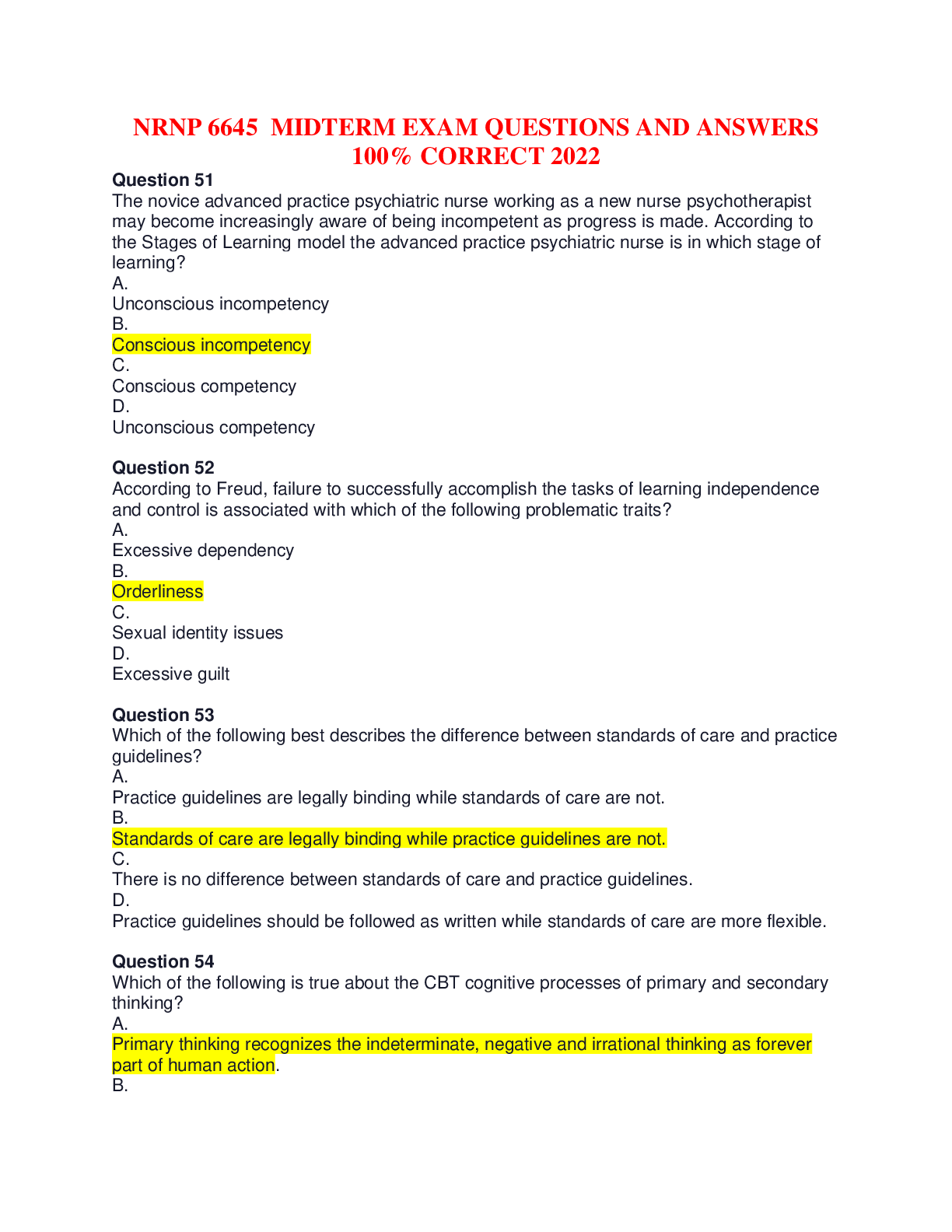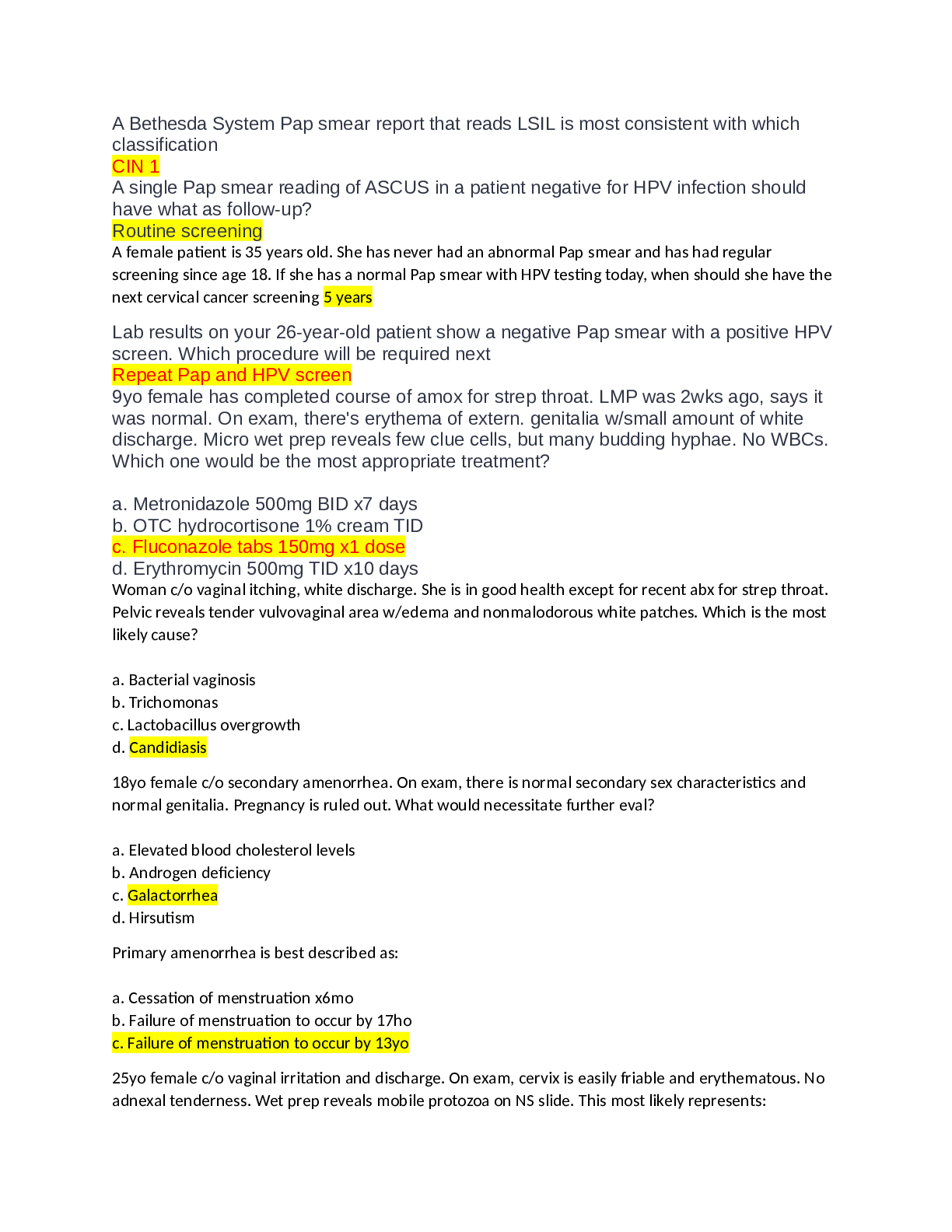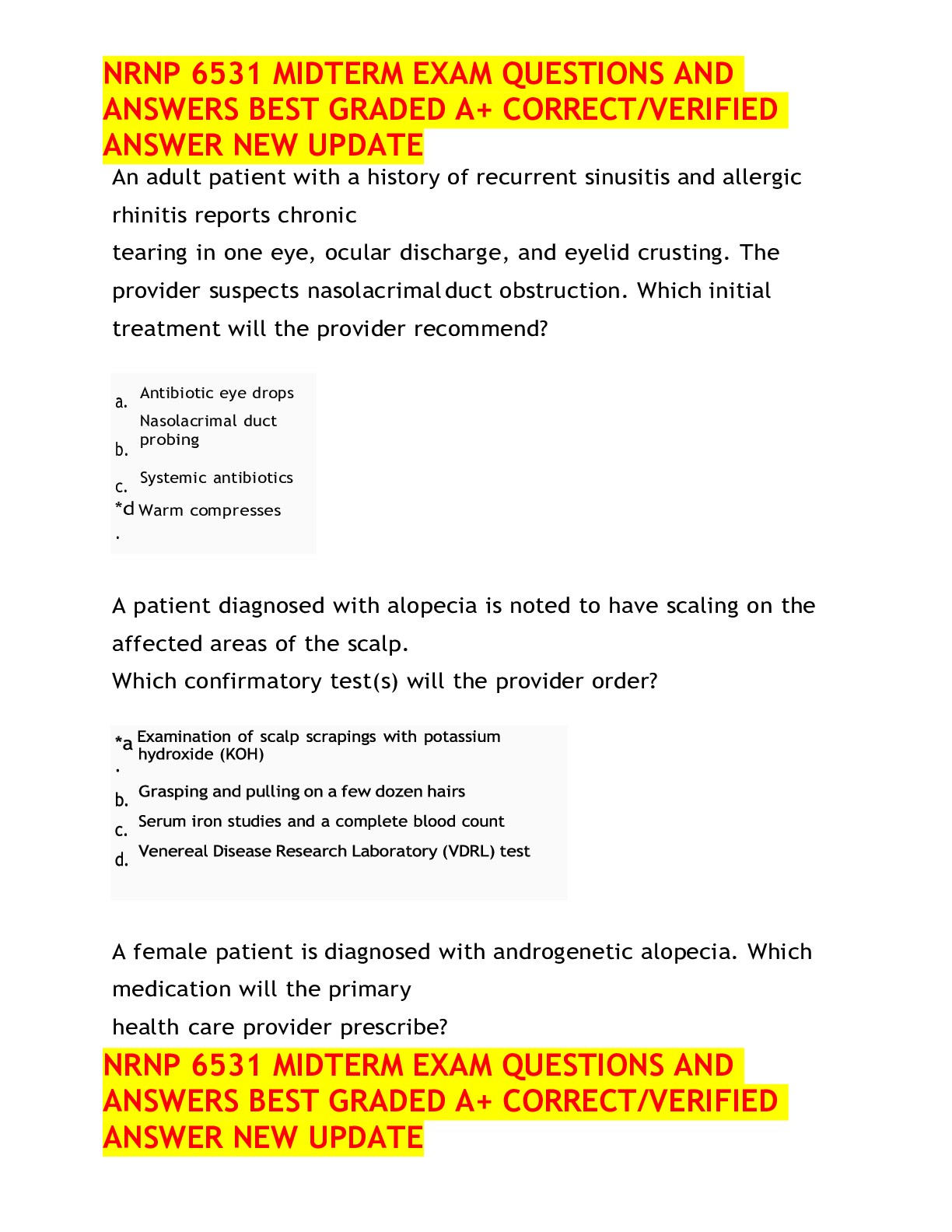Pharmacology > EXAM > NR 508/NR508 Midterm Exam Questions With Correct Answers. CHAMBERLAIN UNIVERSITY (All)
NR 508/NR508 Midterm Exam Questions With Correct Answers. CHAMBERLAIN UNIVERSITY
Document Content and Description Below
NR 508-Pharmacology Mid-term Question 1 2 / 2 pts A patient has three consecutive blood pressure readings of 140/95 mm Hg. The patient’s body mass index is 24. A fasting plasma glucose is 100 mg... /dL. Creatinine clearance and cholesterol tests are normal. The primary care NP should order: a β-blocker. an angiotensin-converting enzyme inhibitor. Correct! a thiazide diuretic. dietary and lifestyle changes. The patient has stage I hypertension. Because there are no compelling indications for other treatment, a thiazide diuretic should be used initially to treat the hypertension. Dietary and lifestyle changes should also be recommended but are not sufficient for patients with stage I hypertension. Other drugs may be added later if thiazide diuretic therapy fails. Question 2 2 / 2 pts An African-American patient is taking captopril (Capoten) 25 mg twice daily. When performing a physical examination, the primary care nurse practitioner (NP) learns that the patient continues to have blood pressure readings of 135/90 mm Hg. The NP should: increase the captopril dose to 50 mg twice daily. Correct! add a thiazide diuretic to this patient’s regimen. change the drug to losartan (Cozaar) 50 mg once daily. recommend a low-sodium diet in addition to the medication. Some African-American patients do not appear to respond as well as whites in terms of blood pressure reduction. The addition of a low-dose thiazide diuretic often allows for efficacy in blood pressure lowering that is comparable with that seen in white patients. Increasing the captopril dose is not indicated. Losartan is an angiotensin receptor blocker (ARB) and is not indicated in this case. Question 3 2 / 2 pts A 50-year-old woman reports severe, frequent hot flashes and vaginal dryness. She is having irregular periods. She has no family history of CHD or breast cancer and has no personal risk factors. The primary care NP should recommend: estrogen-only HT. Correct! low-dose oral contraceptive therapy. selective serotonin reuptake inhibitor therapy until menopause begins. estrogen-progesterone HT. Oral contraceptive pills are not approved by the U.S. Food and Drug Administration for management of perimenopausal symptoms except to treat irregular menstrual bleeding. This patient has a low risk for CHD and breast cancer, so oral contraceptive pills are relatively safe. She is also at risk for pregnancy, so oral contraceptive pills can help to prevent that. Question 4 2 / 2 pts The primary care NP is prescribing a medication for an off-label use. To help prevent a medication error, the NP should: Correct! write “off-label use” on the prescription and provide a rationale. call the pharmacist to explain why the instructions deviate from common use. write the alternative drug regimen on the prescription and send it to the pharmacy. tell the patient to ignore the label directions and follow the verbal instructions given in the clinic. When prescribing a drug for an off-label use, the provider should specify this on the written prescription and should provide a rationale so that the pharmacist understands why the prescription is different from the normal use. Calling the pharmacist would not provide written documentation. Merely writing the different instructions can lead to errors if the pharmacist changes the label to conform to usual standards. The patient may forget verbal instructions and follow the usual regimen instead. Question 5 2 / 2 pts The primary care nurse practitioner (NP) sees a patient in the clinic who has a blood pressure of 130/85 mm Hg. The patient’s laboratory tests reveal high-density lipoprotein, 35 mg/dL; triglycerides, 120 mg/dL; and fasting plasma glucose, 100 mg/dL. The NP calculates a body mass index of 29. The patient has a positive family history for cardiovascular disease. The NP should: prescribe a thiazide diuretic. consider treatment with an angiotensin-converting enzyme inhibitor. reassure the patient that these findings are normal. Correct! counsel the patient about dietary and lifestyle changes. The patient’s blood pressure indicates prehypertension, but the patient does not have cardiovascular risk factors such as hyperlipidemia or hyperinsulinemia. The body mass index indicates that the patient is overweight but not obese. Pharmacologic treatment is not recommended for prehypertension unless compelling reasons are present. The findings are not normal, so it is appropriate to counsel the patient about diet and exercise. Question 6 2 / 2 pts A patient who has had a new onset of AF the day prior will undergo cardioversion that day. The primary care NP will expect the cardiologist to: give clopidogrel after administering cardioversion. Correct! administer cardioversion without using anticoagulants. give warfarin and aspirin before attempting cardioversion. give low-dose aspirin before administering cardioversion. If the onset of AF has occurred within 48 hours, cardioversion can be done without anticoagulation. Clopidogrel is used in other cases for patients who cannot take aspirin. For patients with rheumatic mitral valve disease and AF or a history of systemic embolism, cardioversion plus aspirin is used. Warfarin is used in patients with one or more risk factors for stroke. Question 7 2 / 2 pts A patient in the clinic reports frequent episodes of bloating, abdominal pain, and loose stools to the primary care nurse practitioner (NP). An important question the NP should ask about the abdominal pain is: Correct! the relation of the pain to stools. what time of day the pain occurs. whether the pain is sharp or diffuse. the age of the patient when the pain began. The new Rome II guidelines maintain that irritable bowel syndrome (IBS) of any subtype is characterized by a strong relationship between abdominal pain and defecation because of visceral hypersensitivity to gut-related events. The other characteristics of pain may be assessed to help guide management of IBS, but the first is necessary for a correct diagnosis. Question 8 2 / 2 pts A 55-year-old woman has a history of myocardial infarction (MI). A lipid profile reveals LDL of 130 mg/dL, HDL of 35 mg/dL, and triglycerides 150 mg/dL. The woman is sedentary with a body mass index of 26. The woman asks the primary care NP about using a statin medication. The NP should: recommend dietary and lifestyle changes first. Correct! begin therapy with atorvastatin 10 mg per day. discuss quality-of-life issues as part of the decision to begin medication. tell her there is no clinical evidence of efficacy of statin medication in her case. This woman would be using a statin medication for secondary prevention because she already has a history of MI, so a statin should be prescribed. Dietary and lifestyle changes should be a part of therapy, but not the only therapy. She is relatively young, and quality-of-life issues are not a concern. There is no clinical evidence to support use of statins as primary prevention in women. Question 9 2 / 2 pts A 2-year-old child has chronic “toddler’s” diarrhea, which has an unknown but benign etiology. The child’s parent asks the primary care NP if a medication can be used to treat the child’s symptoms. The NP should recommend giving: diphenoxylate (Lomotil). attapulgite (Kaopectate). Correct! an electrolyte solution (Pedialyte). bismuth subsalicylate (Pepto-Bismol). Antidiarrheals are not recommended in children. Opioids are contraindicated in children younger than 2 years. Bismuth and attapulgite are not recommended in children younger than 3 years of age. Oral rehydration with electrolyte solution is safe for young children. Question 10 2 / 2 pts A patient who has hyperlipidemia has been taking atorvastatin (Lipitor) 60 mg daily for 6 months. The patient’s initial lipid profile showed LDL of 180 mg/dL, HDL of 45 mg/dL, and triglycerides of 160 mg/dL. The primary care NP orders a lipid profile today that shows LDL of 105 mg/dL, HDL of 50 mg/dL, and triglycerides of 120 mg/dL. The patient reports muscle pain and weakness. The NP should: order liver function tests (LFTs). Correct! order a creatine kinase-MM (CK-MM) level. change atorvastatin to twice-daily dosing. add gemfibrozil (Lopid) to the patient’s medication regimen. Hepatotoxicity and muscle toxicity are the two primary adverse effects of greatest concern with statin use. Patients who report muscle discomfort or weakness should have a CK-MM level drawn. LFTs are indicated with signs of hepatotoxicity. It is not correct to change the dosing schedule. Gemfibrozil is not indicated. [Show More]
Last updated: 8 months ago
Preview 1 out of 46 pages
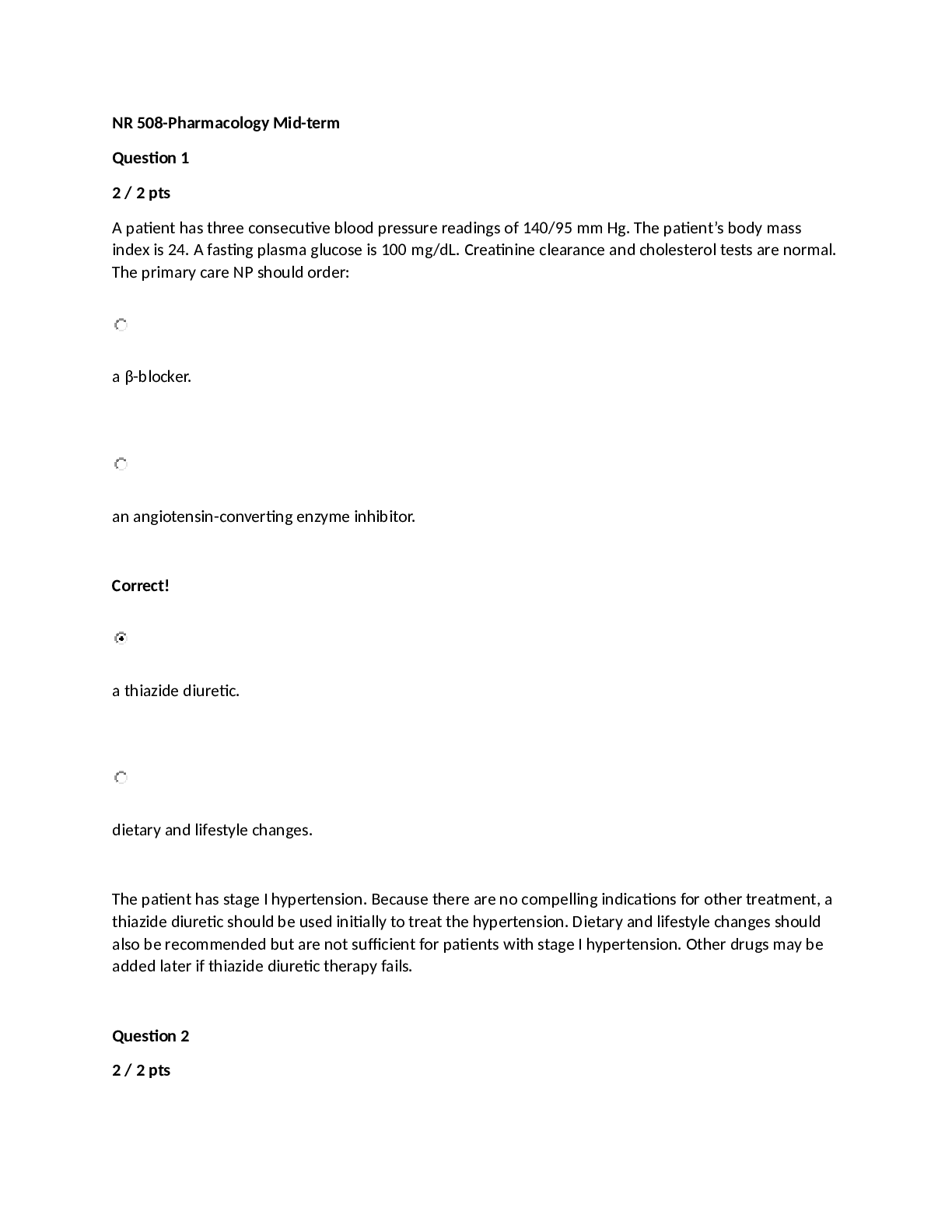
Reviews( 0 )
Document information
Connected school, study & course
About the document
Uploaded On
Oct 27, 2020
Number of pages
46
Written in
Additional information
This document has been written for:
Uploaded
Oct 27, 2020
Downloads
1
Views
87

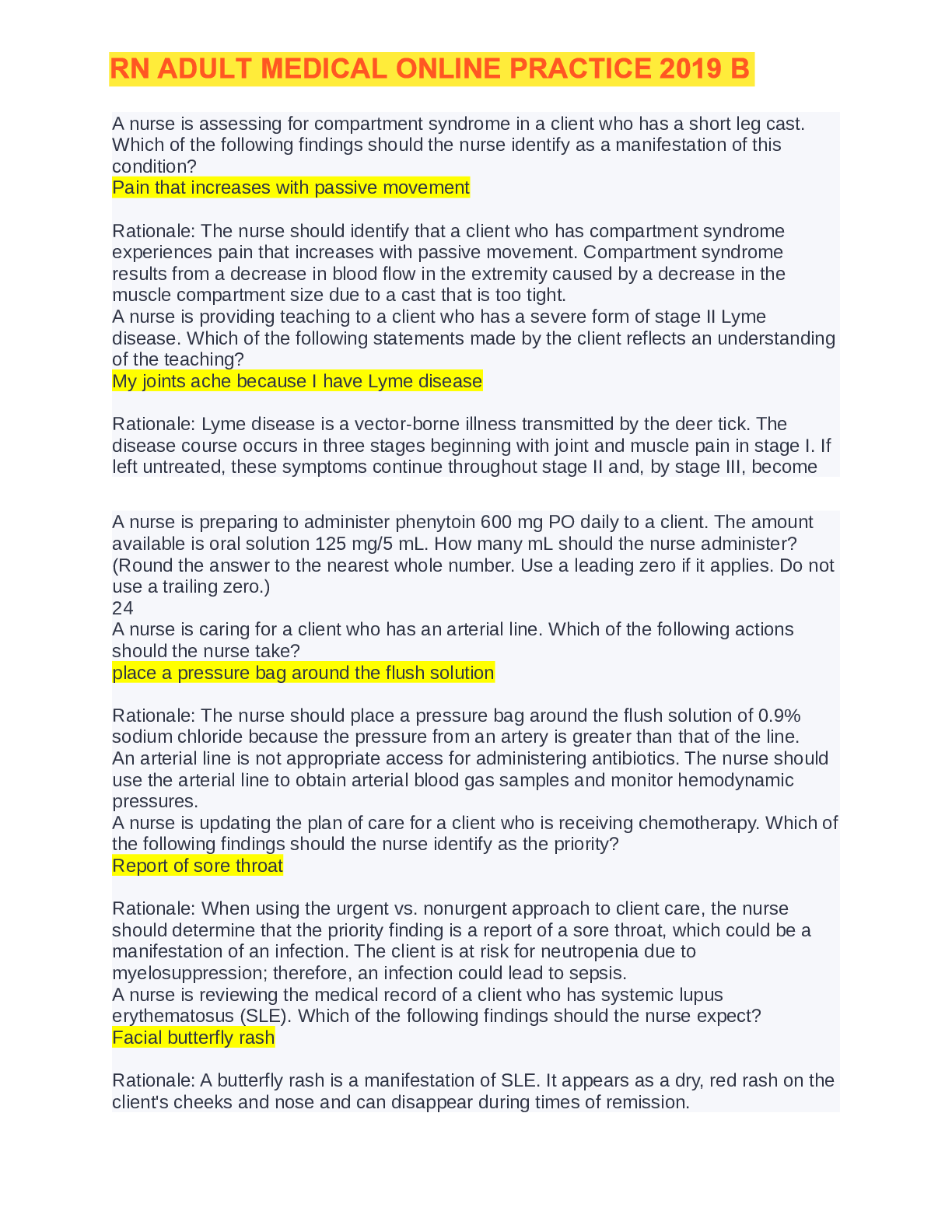
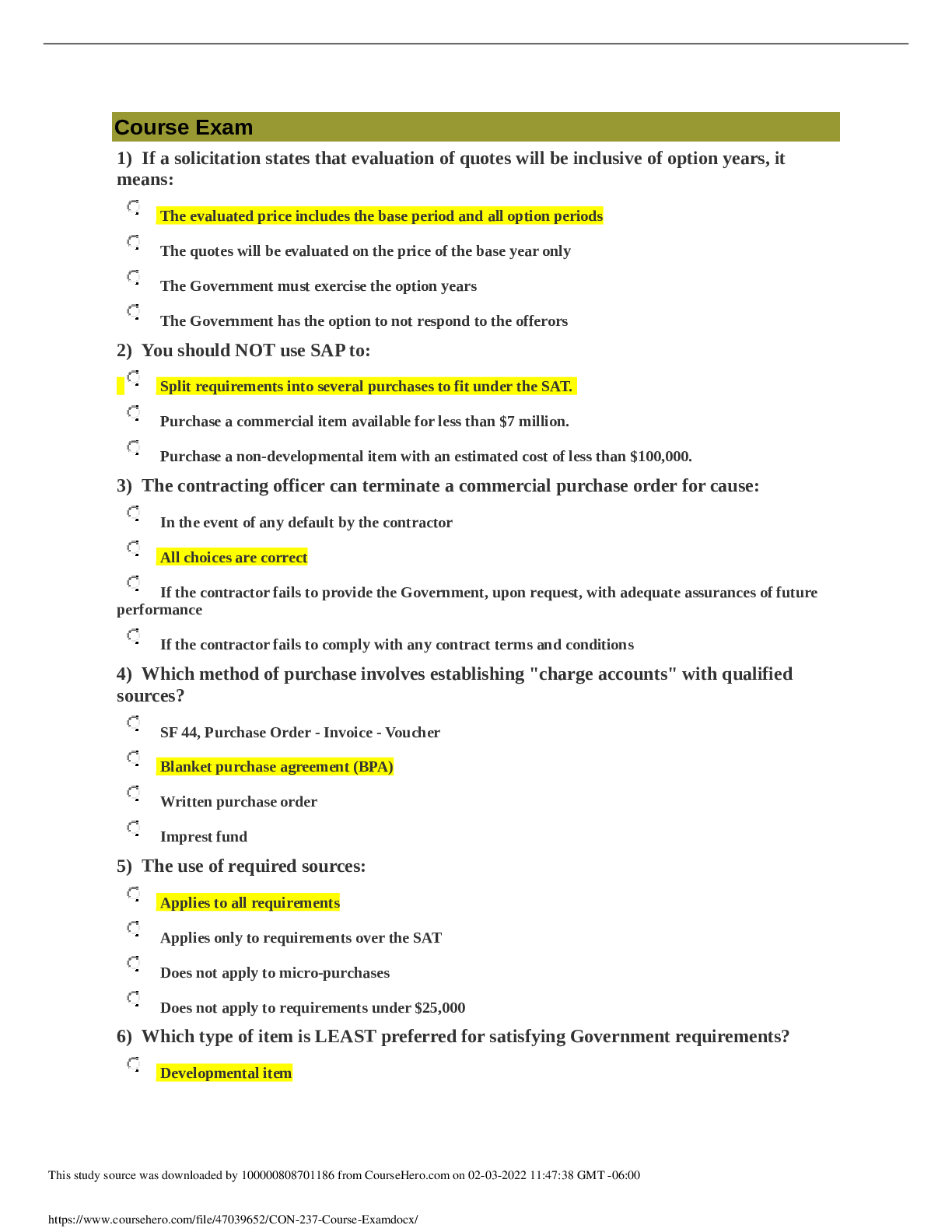
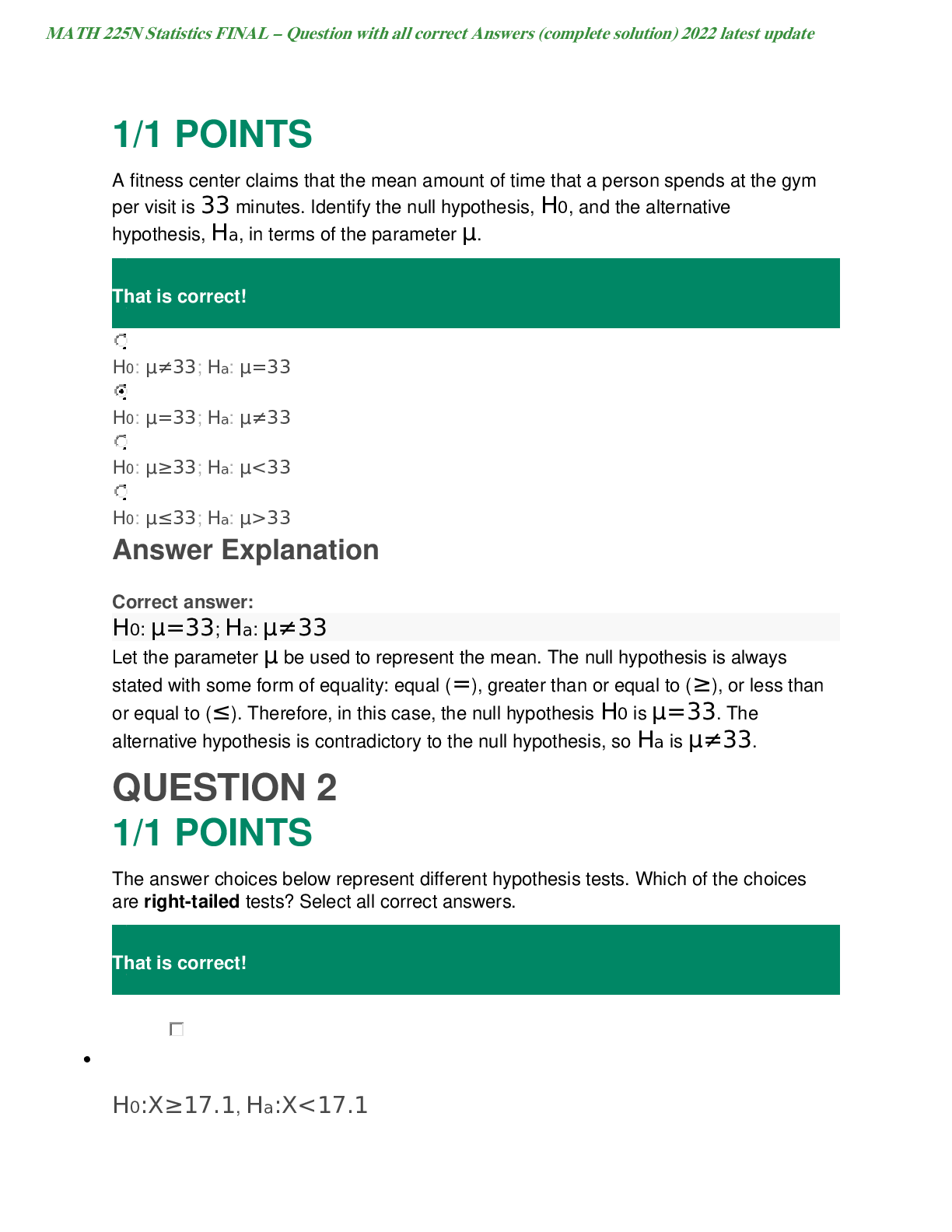

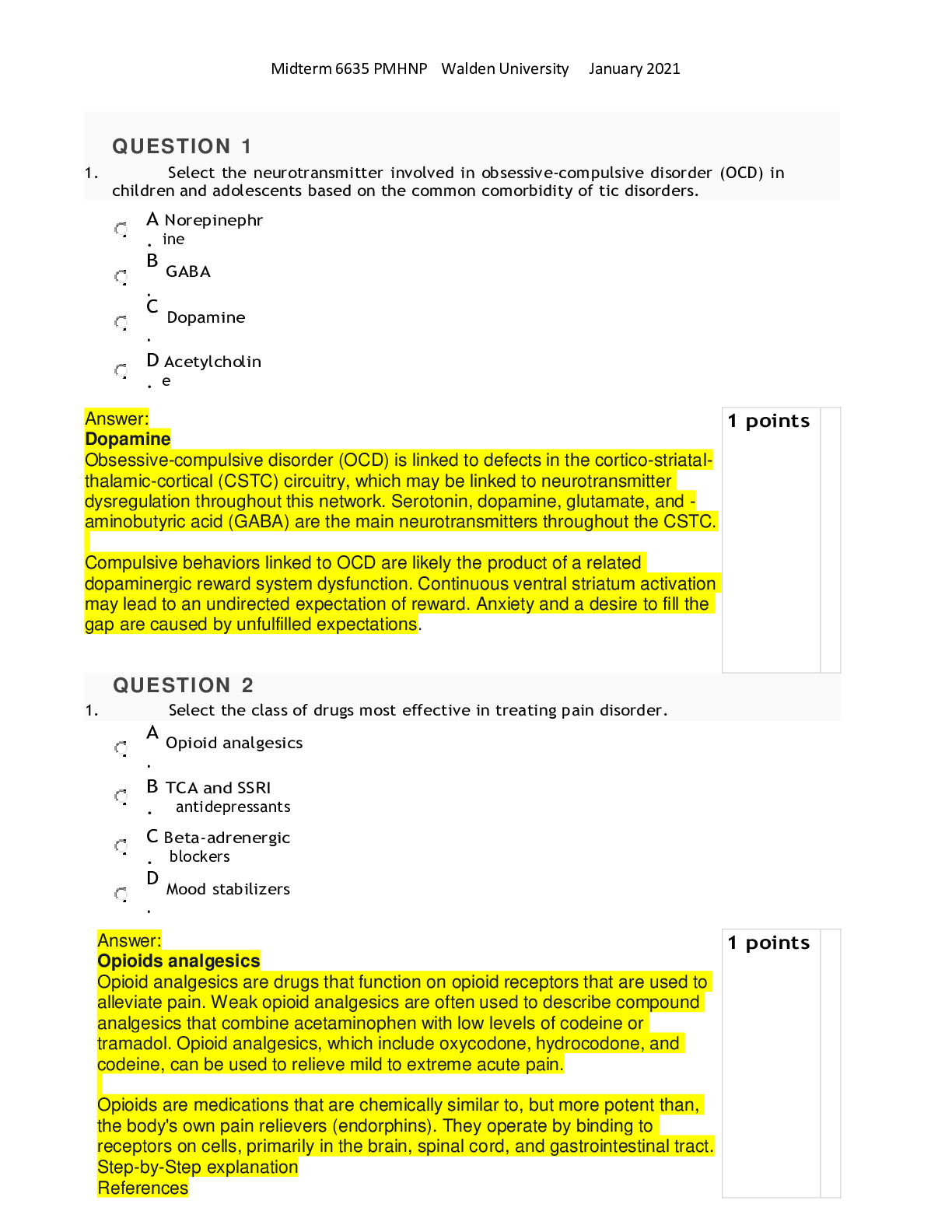
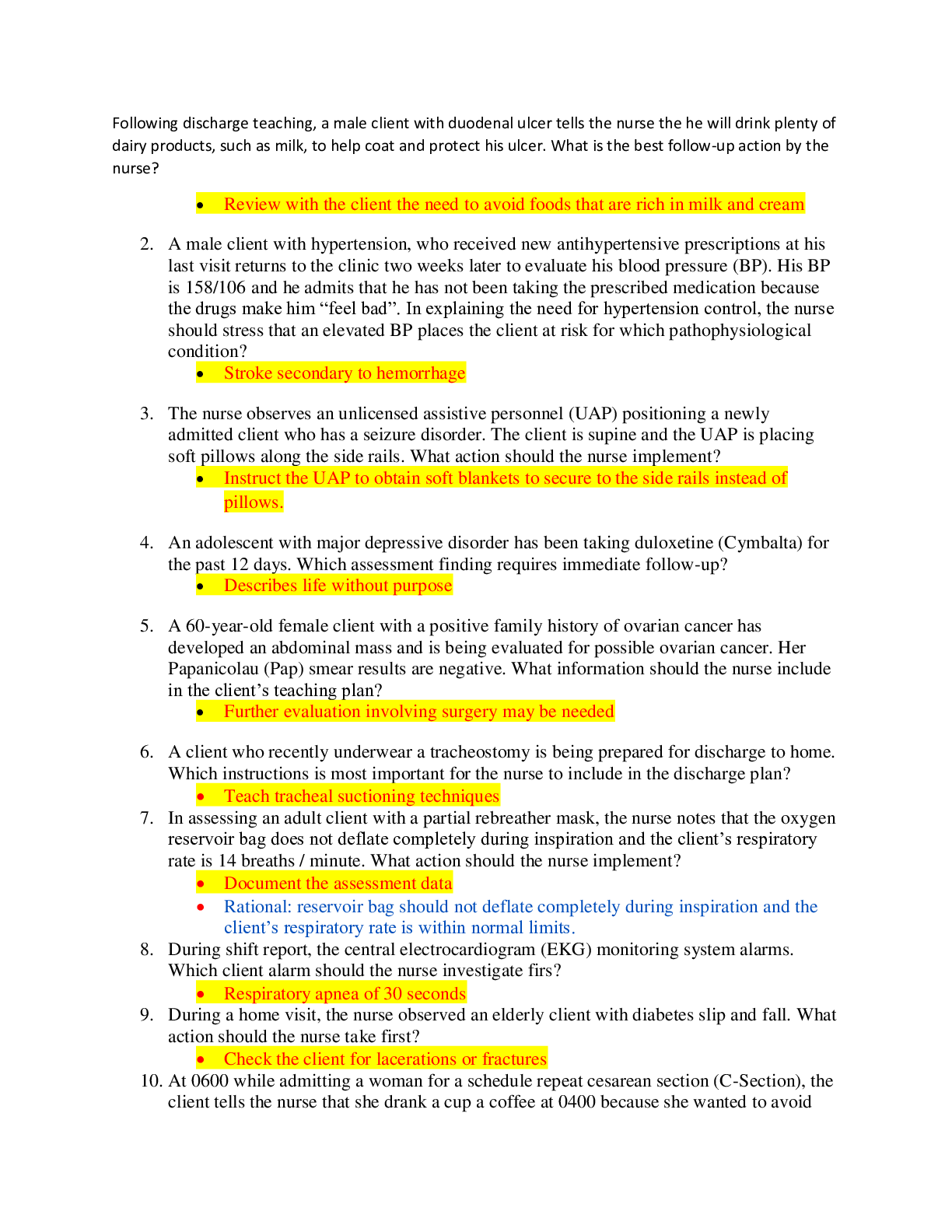
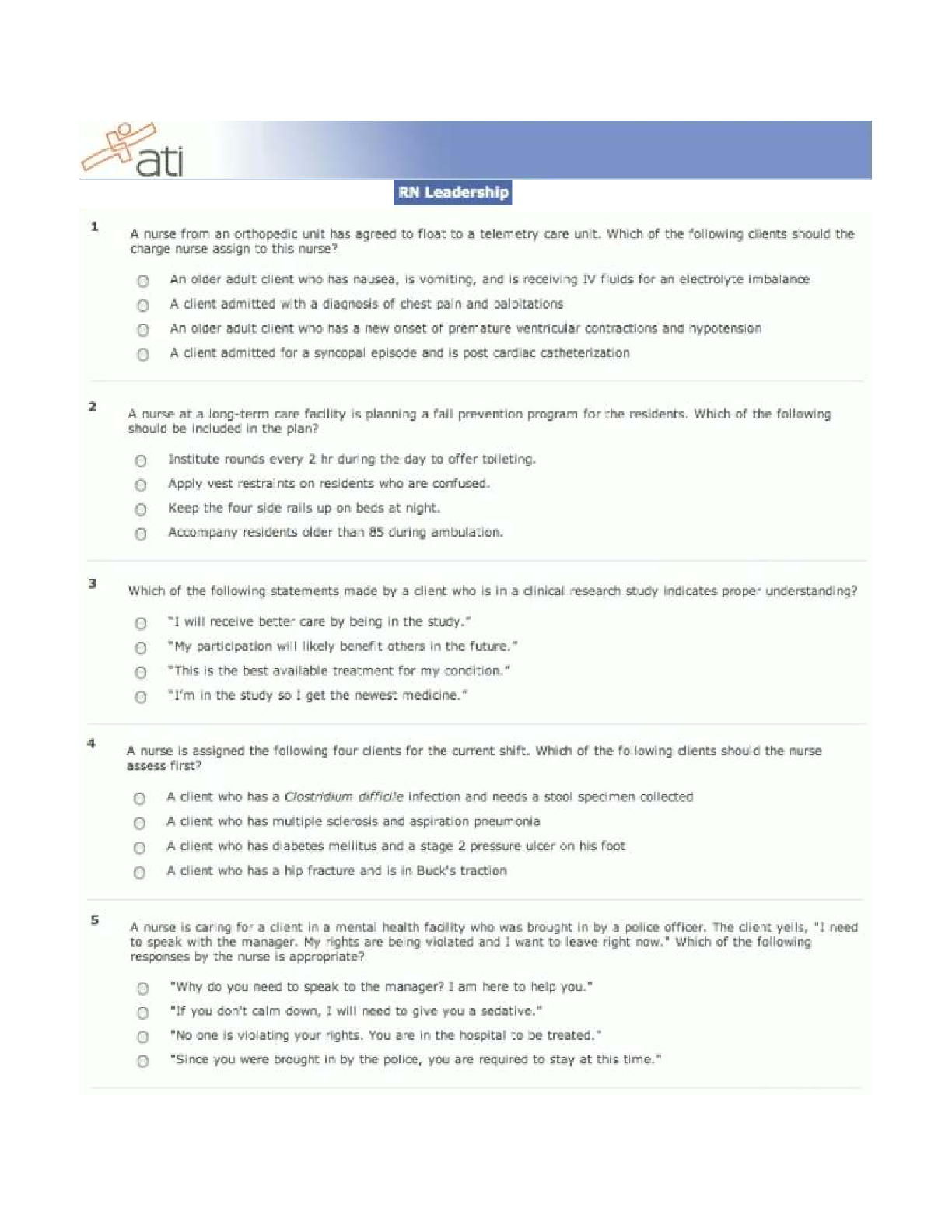

; Answered.png)
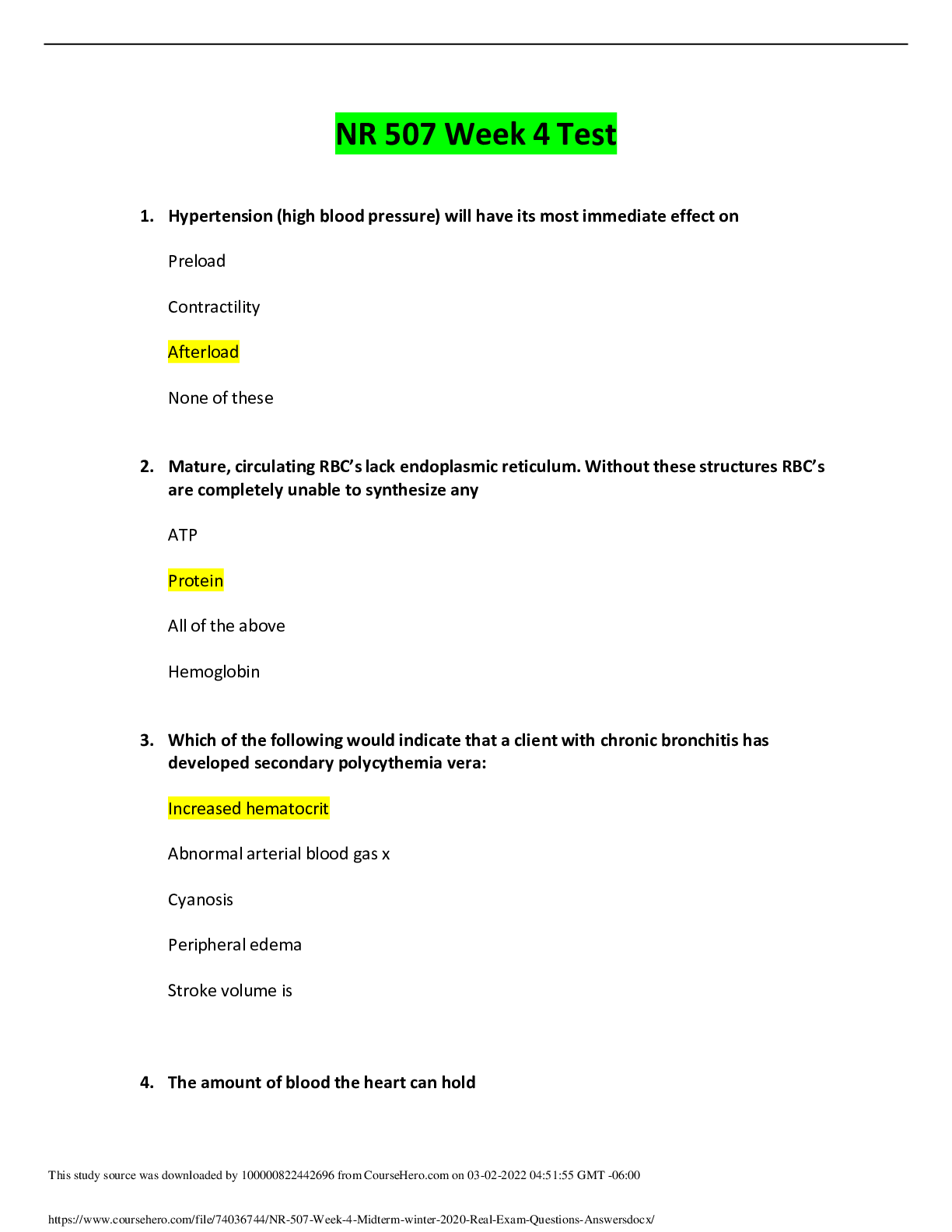
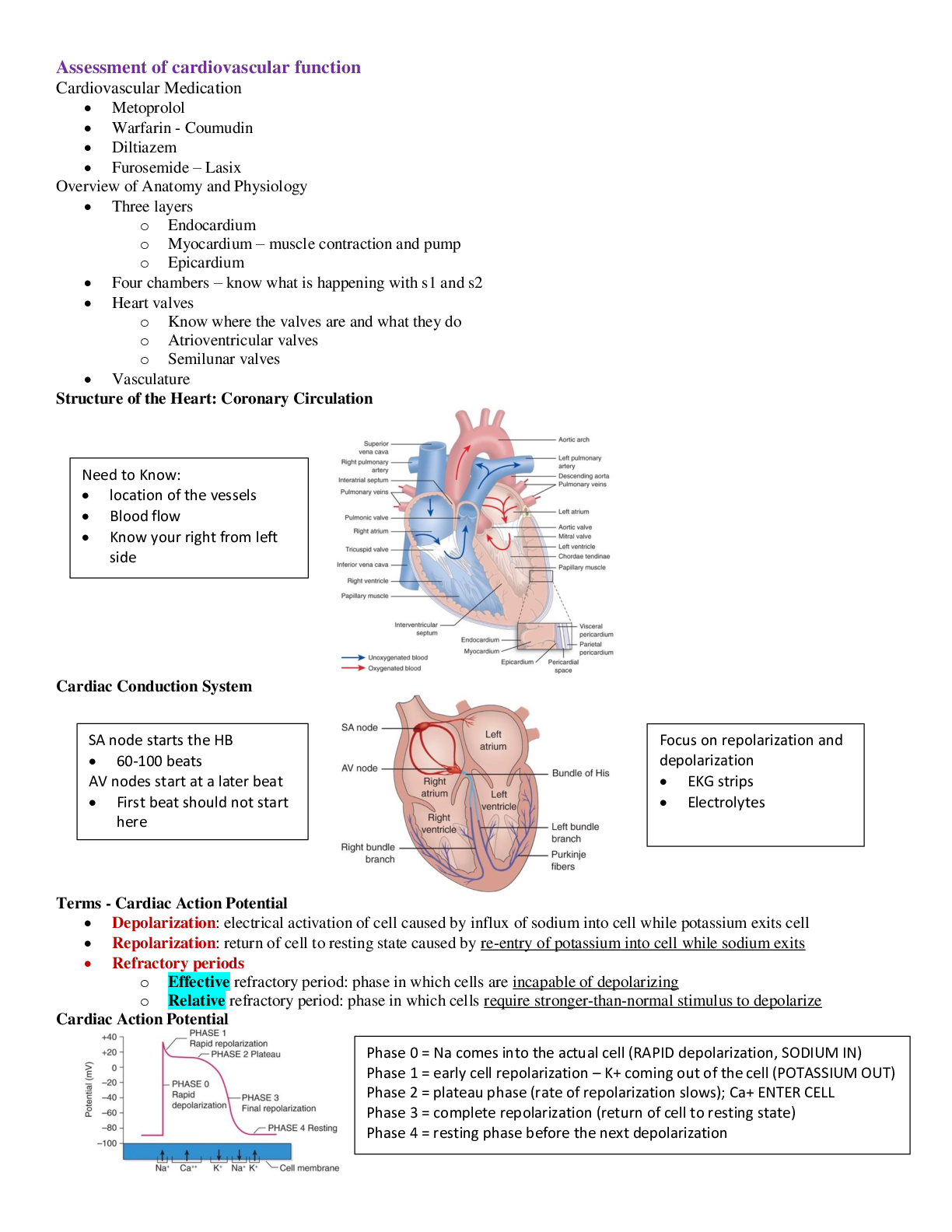
COMPLETE SOLUTION KAPLAN UNIVERSITY.png)
